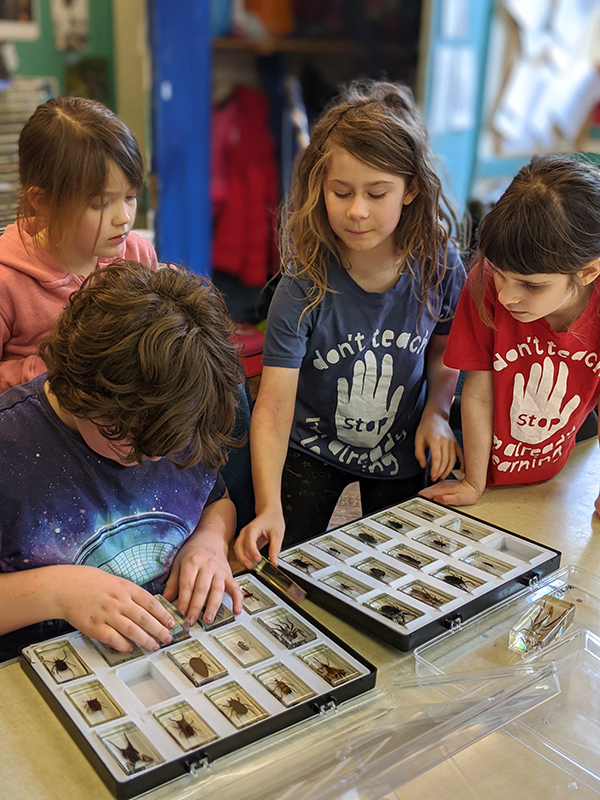As the crisis in education heightens more and more people are questioning the system. The number of families opting out of the mainstream school system in favour of Home Education is increasing year on year. The number of teachers quitting after just one year in the profession is at an all time high. It’s hardly surprising that more parents and educators are looking for alternatives. But what do you do if there is no alternative near you?
We receive emails weekly, sometimes as much as daily from parents and educators considering starting their own democratic or self-directed project and wanting some advice to help them along the way. So here’s what I tell them.

Don’t. Don’t unless you really have to. A project like East Kent Sudbury will take over your life in ways you can’t possibly imagine at the beginning, even if you think you know what you are getting into. The challenges are numerous from finance, to planning permission, marketing to dealing with hostile press, navigating regulations to explaining your vision to prospective families. And the chances are you will have to manage all of it whilst juggling family life, paid work and a multitude of other commitments. Finding others to help you will be essential. But, although you will meet many along the way that share your frustration with the mainstream, views on the right alternative vary wildly and in any one geographic area there are usually a limited number of people that will share your vision, and even fewer that have the time and resources to help you make it a success. Which brings me back to my original point. Don’t unless you have to.
There are already many start-up groups around the country looking for passionate founders just like you. Many projects that make it to the opening stage struggle to get past the crucial number of students needed for the project to be financially viable long term. I dream of a day when every town will have multiple educational options, from a conventional school to a progressive school like a Steiner or Montessori, to a Self-Directed school like Sudbury and varied options for Home Educators as well. But, to reach that point where settings like EKS are considered a viable alternative or even dare I say it, the norm, more schools need to last well beyond those first formative years. We need more schools with the staying power of Summerhill, Sands, Sudbury Valley, The Circle School, Hudson Valley Sudbury School, De Ruimte and Tamariki. But we will only get there by pooling our resources and creating more long-lasting schools, each one a model for others to follow. And to do that, these settings need to grow to a sizable number and unless they are located in a really densely populated area, that’s only going to happen by some families relocating to join them.
I asked Naomi Fisher, parent of two, why she chose to relocate her family from the London suburbs to Paris so her children could attend a democratic school there, rather than starting her own school nearer to home. Here’s what she said:
“Well, we did think about starting something. But when I started to look into it, it seemed that there were many small struggling democratic schools, and everyone seemed to want to start their own project rather than joining existing schools. Plus it looked like even though it’s expensive to move country, it was even more expensive to start a school.”
Read more about why Naomi relocated for a democratic school here.
If it’s at all feasible for you (and of course work, family, visas and other things sometimes mean that it’s not) look for an existing school or start-up project and move to join it. We are always eager to hear from others that would like to join our team and help EKS grow and thrive. Margate is a great place to live with a thriving cultural scene and blue flag beaches and an already established self-directed democratic learning community. Get in touch to see if we need someone with your skills. The Freedom to Learn Network in the UK is another great place to start to find possible collaborators and learn from others that have been where you are now. Join their Facebook group and attend the annual festival to see if there is an existing setting that’s a good fit for your vision and values.

If you can’t move. Or you didn’t find anywhere with the right fit. And you’re still determined to make the leap, even after you’ve been scared by others’ founding stories, and want to create something yourself – here are some things to think about:
- Do lots of research. Read everything you can. Go to as many festivals and conferences that you can get to. EUDEC, IDEC, AERO, ASDE and the Freedom to Learn Network are just a few bodies that regularly organise conferences. Look into as many different schools and models as you can, even if you are instinctively drawn to just one you will understand it better for the comparison. Try to visit schools if you can, many are open to visits, but also don’t be offended if not everyone welcomes you in. If we agreed to a visit from everyone that contacted us we would have visitors almost every day we are open – it’s simply not viable. Your request is more likely to be accepted if you have done some research beforehand and if you can offer something of benefit to the school you’re contacting.
- Create a clear vision. There are many successful school models already established, rather than reinventing the wheel it often makes sense to base your project on something that has already been proven to work. However, each setting is unique, it exists in its own location, its own culture and it’s important that you consider how your chosen model will fit in with where you are and the values of your wider culture. You can’t just import a foreign culture and expect it to work. That said, there is also nothing wrong with deciding that after all your research you want to create something new. If you do, just be really clear about what that is and how it will work.
- Find people to help you. We found our start-up group through social media, word of mouth and open public meetings. People got in touch and said they wanted to help. Given the amount of time and energy needed to make your project a success it’s better to join forces with those that make the effort to turn up to your meetings, that track you down even when you don’t reply to their email right away and so on. Many people will want to help but don’t have the time to drive the project forward. You will still need the support of these people, even just talking about your project to their friends will help, but be realistic about how much work someone has time for. And be prepared to do a lot of the work yourself.
- Don’t rush it. It’s easy at the start to get over-excited and carried away looking at buildings. We looked at the perfect site 3 months in when we didn’t even know what kind of project we wanted. Now, of course, no building will ever match up to that. It takes a long time to get the right vision and the right team. And while you are creating your vision and forming a team, you are also building support from the families that will eventually form your initial enrollment. Don’t be fooled by initial enthusiasm. Only a tiny percentage of the people that initially expressed interest in EKS ended up joining us as staff or enrolling a student, it takes time to build the support you need. The practical stuff is important but when you are ready those things will come together, somehow.
Good luck and I hope to meet you at a conference someday soon and hear all about your journey.
Here are some further links to kickstart your research:
So you want to open a democratic school – here’s how by Aaron Keohane.
What it takes to start a democratic school by Mimsy Sadofsky.
Education Revolution: Help Us Reach the Tipping Point by Peter Gray.

Hi I run a democratic school in west London. We have been open since April 2021. We are growing gradually and have positive feedback from parents.
I would love to make connections with other schools like ours.
We currently have 20 young people attending and looking to expand to a regular 30.
I was wi seeing what areas you are recruiting in?
Hi Jacqui, Please do get in touch with me via email at kate.coleman@ekss.org.uk to discuss further. 🙂